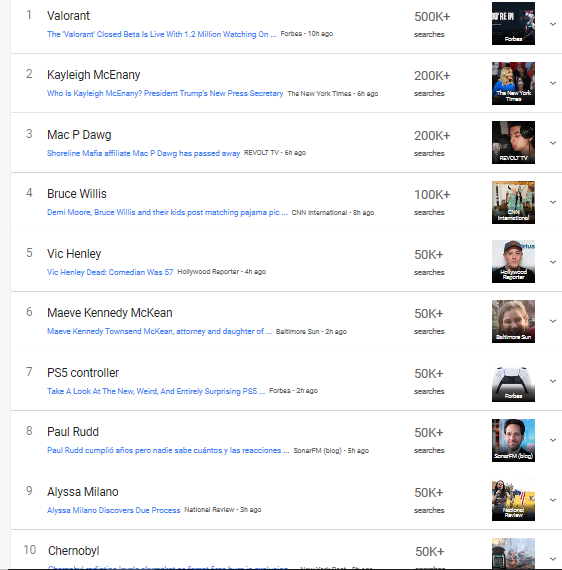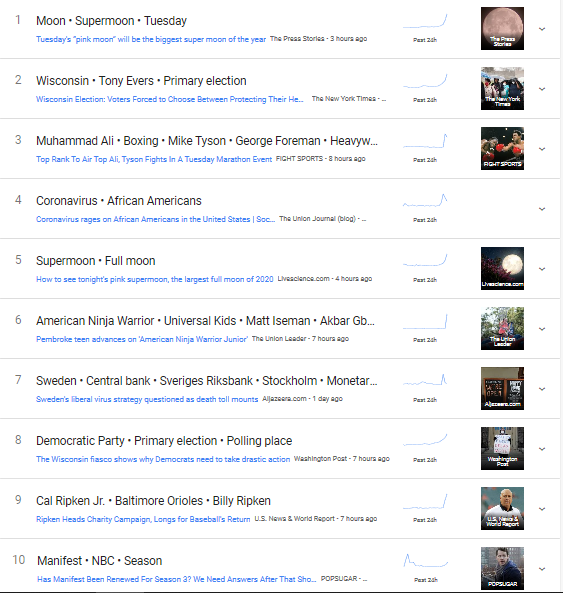
The affliction of nervous fidgeting is now a searchable bounty of intrigue.
Outside of the racy vertical walls fortifying polite society against the powerful influence of the perverted arts tempest, the leading search engines are pliable and allegedly transparent in reporting the most popular search terms daily as a helpful gesture to consumers. The seemingly neighborly gesture resounds with the benign quirkiness of a Jay Leno late night skit featuring struggling actors cast as startled harmless pedestrians squirming under the bright lights of 15-seconds of fleeting fame in the dawn of the reality TV movement.
As the disarming catalyst for subterfuge relies on deflection, the public relations departments of the respective Silicon Valley hive minds engage in indoctrination on par with the descendants of the opium-wielding Chinese oligarchs before the onset of the Cultural Revolution, by adopting a similar nefarious disposition and inflicting horrific ghastly acts with a twisted beaming smile to achieve a self-serving pilgrimage. F***book and the other social networks employ involved and complex moderation efforts to preserve a clear bias, and Google and Bing simply have to achieve information overload to accomplish similar goals, which is well within the standard playbook of navigating through the information age. It is all about dictating perception, through repetitive reinforcement, and patiently sowing the fields of branded groupthink.
While the unbearably homicidal sneering gaze encapsulates the subtle nuances defining bone-chilling terror, the gruesome offenses of the search engine hiearcy are not physical in nature, but effectively assault the mental state. Inundate by thirty of pages of search results forged by a pervading ideology and advertising dollars, the average person using a device for the sake of knowledge does not have the time or the patience to tediously comb through 300 links in unveiling truth. The reprehensible abbreviated attention spans forged by instant gratification and pop culture offer a pathetic force of resistance fighting against the tactics of the digital corporations. While, willful embellishment and manipulating probabilities is slang for a deliberate and ongoing misinformation campaign spearheaded by the company leadership, a perpetual endeavor practiced annually, the scattered remaining examples of cognitive resourcefulness exist tediously in an everchanging world.
Among the putrid craftiness in reengineering the truth, the tech-laden pupils dilated and faces numb, but still noticeably smug under the influence of Sodium Pentanol with limbs helplessly shackled to a dental chair housed in an obscure Maine catacomb, is exactly the mirage of vulnerability which equates to widespread coercion and logarithmic profits gained during an exhausting scandal propelled by reactionaries. Only within the blatantly overzealous and indomitably defiant counterproductive pretense comprising the adroit shrieking glibness of underlining victim culture, can a multi-billion dollar corporate entity be synonymous with the idea of quaint, and within the convoluted everlasting love of ambiguity, actually receive online invites to therapy groups.
While Google and Bing prove as effective tools to individuals with an affinity for professional research and informational management systems, the search engine behemoths rely in the spur of the moment abbreviated queries quenching the thirst of instant gratification and wetting the appetite of the most financially lucrative businesses on the globe. Each month, the pair of organizational database superpowers of dynamic content, release a list of the most popular search terms, which should be treated with a vigilant skepticism, and is graciously filtered not to include the hot-blooded demand for adult carnal online destinations, which distressingly overlaps mind boggling demographics on a simple X-Y graph that typically illustrate linear sanctity.
As the powers that be at Google welcome a pandemic, or any act from a higher power that results in a change to the administration, the propensity to promote the narrative of Coronavirus as an abject failure by the federal government will dominate the infrastructure of frontline code and bots, but will not be reflected in the daily keyword standings. The implication alone brusquely emanating from a company that very publicly holds and anti-Conservative bias will resonate with the legions of ideological warrior employees and hundreds of millions of associated colleagues across the globe. While Microsoft cannot escape the stigma as a sanctuary for the liberal agenda, Bing and the lesser known search engine conglomerates parrot the move of big brother which gratefully does not extend past the threshold of planning a full-scale launch of self-driving vehicles in a bold attempt to hijack US roadways from human drivers.
Similar to the questionable validity and mistrust surrounding China’s release of information across the board, Google compiles a daily list of the most popular search terms that should be handled with careful discretion and rubber gloves. If the results of the list are not at least an indictment to one of the world’s most diversified tech outlets, the base interests sampling the mentality of a mass audience does not conjure up a wealth of optimism for the fate of the near future. Cue the drumroll… The winner of the unofficial head buried in the smartphone hunt and peck feverish non-Coronavirus porn-free quest for useless information on a nondescript April Tuesday is- “Valorant”???
Yes, a newly released video game is at the top of the heap as the most sought after passively researched topic on Google. Not the state of the economy, government overreach, business closures, virus overreactions, the British Open cancellation and the future of professional sports, resources for lost wages, or guidelines for pandemic dating, but the latest gaming gem. Due to extenuating circumstances, folks should not be castigated for attempting to escape reality, but the Google’s list is pretty telling of how fleeing priorities are the vortex of a crises. Bing has also launched a resource which apparently self-monitors and ranks keyword searches.

The top-10 trending search terms according to Google. (courtesy trends.google.com)
Ironically, the leviathan of the internet ocean depths aggressively harvests and processes end-user data, and cherry picks information from an account holder’s email, search history, and browsing habits to paint a picture of the world in a beneficial manner in which the company views the world. Similar to F***book and other publicly traded and private businesses trading lists of specific consumer digital behaviors in generating billions of dollars of advertising revenue, the tech consortium provides amnesty to customers in the wake of the Cambridge Analytical debacle. Disturbingly, individuals with Google accounts were given access to their own private dossiers and years of collected information and sensitive data that proves the internet has a perfect memory, and that the Silicon Valley tycoons have stranglehold on the average consumer. This realty is especially pronounced when a slew of companies are joining forces indirectly in forwarding a political agenda, the hypocrisy of the software collective openly promoting innovation and a diversity of perspectives, however only if the stipulation is satisfied that progressive causes are endorsed and supported.
Google also publishes a list of real time search terms over a 24-hour window which provides a more comprehensive insight into the behaviors of the consumer base, even if the figures are treated with a sensible 20% of confidence in honesty. However, the contrived snapshot indicates that the numbers of most-likely cooked and adds an additional layer of constant feedback assaulting the subconscious of Americans. The complete nature of the environment is disappointing on all levels. When in doubt, always default to Duckduckgo.com to perform non-invasive online searches.

The Google 24-hour trending list is a bit more organic and relatable.
As search engines are replacing traditional news outlets as what the audience believes to be a reliable and comprehensive source of information, the nefarious tactics spearheaded by corporate policy to deliberately bury conservative content and related searches under the pretense of nonsensical and confusing verbiage is only the beginning an ambitious and calculated campaign to at the very least dominate the market share, and tinker with aggressive behavioral experimentation. In the age of super corporations an individual’s selling point adheres to a more fair market value than in times of fierce and fractured competition. Along with the conundrum of “who is regulating the regulator?”, the laissez-faire founding premise of the internet promotes deregulation, as every person is effectively fighting for themselves.
The mantra of the tech realm has always been to hold society at bay by making simple processes tediously complex. With the Clockwork Orange methodology of forcing rhetoric into the unblinking eyes of a widespread and captive audience, of course, minus the eyedrops, the plan of action easily falls intoplace.
In a culture where the Second Amendment remains a controversial topic thanks to the radical element of extremists, conducting a simple search on Google in finding a justifiable self-defense story, is as unlikely as avoiding an inane quasi-debate on social media with a random avatar and an annoying username, the efforts of which will be written off as a net waste of energy within the accounting department of the universe.
Using the once dutiful search engines which at one point bestowed a mercy upon political adversaries in the form of at least giving the benefit of the doubt, are almost to a level of obscurity with far reaching consequences.
—
This editorial and search support provided by Duckduckgo.com